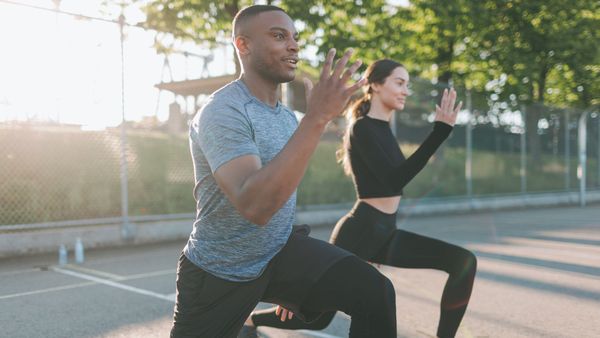Most of us know the physical benefits of exercise, such as reducing the risk of disease, managing weight, and improving bone and muscle strength. But did you know that exercise also plays a key role in your overall well-being?
Research has shown that regular exercise can help reduce stress, anxiety, and even depression. For example, a 2018 study published in JAMA Psychiatry found that people who exercised for 30 minutes three times a week were 17% less likely to experience depression and 25% less likely to experience anxiety than those who did not exercise.
I have had an up and down battle with physical fitness. I will start, do great, feel great, and then something sets off my routine and it ends! Then getting started again becomes a difficult task that I will put off again and again. But, when I do start up back up, I notice I feel so much more motivated, energetic, and less anxious then when I don’t. Once I get into a regularly exercise program, I often feel guilty missing it and want to continue. To me, it’s really about making it a priority in my life and having a set but flexible schedule to keep me on track.
But What is Exercise and How Much Do I Need?
Exercise is anything that involves physical activity that increases your heart rate above resting levels. It can be anything from going for a walk, to riding a bike, to weight training. It doesn’t really matter as long as you get your body moving. Doing chores around the house, gardening, or playing in the yard with kids or pets are ways you can fit some activity into your daily routine.
Aerobic Exercise: Usually involves higher intensity exercise for a longer duration and improves how your body uses oxygen. This can help with blood pressure, circulation, and cardiovascular disease and is beneficial in reducing stress.
Anaerobic Exercise: These exercises are high-intensity movements that last about 2 minutes, such as weight lifting, jumping rope, sprinting. The focus is to build strength and muscle which help to burn fat and maintain a healthy bodyweight. This exercise often improves mood and self-confidence.

Agility training: These exercises involve changes in movement, like changing speed and directions, all while maintaining control. Agility exercises are often associated with sports such as tennis, football, and soccer. It has been known to improve mental focus.
Stretching and Flexibility: Think yoga! These stretching exercises can help with arthritis, while focusing on your breathing can help ease anxiety and depression.
Currently, the CDC recommends that adults get 150 minutes a week of moderate intensity exercise plus 2 days of strength training. Explore the current physical activity guidelines for more information.
But don’t be discouraged if that seems like too much! You can spread your activity into 5 days a week for 30 minutes, or even break it down into smaller chunks throughout the day.
Exercise Snacking
A new fitness trend is call exercise snacking. Think of getting a snack, it’s not a complete meal, but just a little something between meals to hold you over. Exercise snacking is the same concept. You break up your day with short bursts of exercise. For example, while watching TV, take a moment to get up and do some push-ups, jumping jacks, or really anything to get your heart rate up a bit. If you are mostly sedentary at work, take a few minutes to take a brisk walk or climb some stairs.
Exercise snacking can give you a boost of energy and increase mood and productivity. Just walking 2 minutes every 20 minutes reduces blood sugar. The best thing is, it’s easy to do and you don’t necessary need to be in “workout” attire.
How Does Exercise Benefit Mental Health?
Releases endorphins. These are your brain’s feel good neurotransmitters, or chemical messengers, and help you to move, feel sensations, and keep your heart beating.
Reduces stress. Ever hear of the flight or fight response? This is the response that our body has when we feel stressed, and exercise allows an escape from the build up energy we may experience when we are stressed.
Improves sleep. Exercise helps burn off energy, helping you to feel more relaxed and tired at bedtime.
Increases mood and self-confidence. After you complete a workout, you will feel a sense of accomplishment and at the same time improve your physical health.
How to Get Started
It's always a good idea to talk to your doctor before starting any new exercise program, especially if you have any health concerns.
- Choose activities that you enjoy and fit into your lifestyle
- Start slow and increase the time you spend gradually, don’t burn yourself out!
- Set realistic goals.
- Find a workout buddy or join a fitness class
- Make exercise part of your everyday routine.
Exercise is a powerful tool that can improve both your physical and mental health. If you are looking for ways to improve your mood, reduce stress, and boost your overall well-being, consider adding more exercise to your routine.
While exercise is not a cure for mental health conditions, it can be an effective way to manage symptoms and improve overall well-being.
If you are struggling with your mental health, don’t hesitate to reach out to one of our compassionate clinicians.
For more information, call 844-4-ACENDA (844-422-3632 ext. 9500) or visit our website
Sources:
About the author:
Stephanie Taylor is the Communications and Development Manager at Acenda, where she uses her passion for helping others to create compelling content that raises awareness about behavioral health and hopes to inspire others. She has a BA in psychology and over 25 years of experience in the behavioral health field. She is also a mom to three young men and enjoys spending time with her family and friends, gardening, and reading.